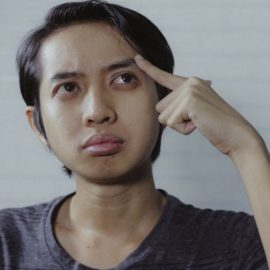

This article is an excerpt from the Shortform book guide to "Humankind" by Rutger Bregman. Shortform has the world's best summaries and analyses of books you should be reading.
Like this article? Sign up for a free trial here .
What lies at the core of human nature? If you stripped away civilization, would we be fundamentally compassionate creatures? Or would we cheat, lie, and steal, with only self-interest in mind?
In Humankind: A Hopeful History, Rutger Bregman argues that our species evolved to be friendly and compassionate. When we do evil things, he maintains, it’s not because we’re evil by nature, but for a variety of other reasons, including our desire to conform and to act for the greater good.
Below is a brief overview of Humankind: A Hopeful History by Rutger Bregman.
Humankind: A Hopeful History
In Humankind: A Hopeful History, Rutger Bregman suggests that most of us think of humans as naturally deceitful and cruel, seemingly with a lot of evidence to back us up: Throughout history, groups of humans have gone to war, committed genocide, and owned slaves. But despite our history of evil, Bregman argues that humans are fundamentally good.
Bregman suggests that this idea—that human nature is good, not evil—has important implications for our world. When we see people as fundamentally generous and kind, we’re more likely to form meaningful relationships, help strangers, and fight against injustice. According to Bregman, these actions lay the foundation for a more trusting and peaceful society.
This guide consists of three main sections. First, we’ll explain the long-standing philosophical debate on human nature. Then, we’ll discuss Bregman’s argument that humans are inherently good, reviewing the evidence that he provides. Finally, we’ll focus on why Bregman believes that a more positive view of human nature can change our world.
(Shortform note: Bregman generally organizes his evidence in chronological order, starting with archaeological evidence and progressing to more recent history. He then discusses why it matters whether humans are inherently good or evil. This organization is useful because it lays a solid foundation of historical evidence supporting Bregman’s argument, which he then builds on throughout the later chapters. That said, within each section, Bregman often jumps back and forth between historical periods to discuss specific studies. In this guide, we’ve reorganized and combined some material to further draw out the book’s chronological structure.)
Throughout the guide, we’ll fact-check Bregman’s claims about human evolution and psychology. We’ll also elaborate on his main themes, including the negative impacts of civilization and the reasons why we commit evil. Furthermore, we’ll connect his discussion of human nature to the views of other authors such as Philip Zimbardo (The Lucifer Effect) and Daniel Kahneman (Thinking, Fast and Slow).
The Debate: Are Humans Good or Evil?
For millennia, Bregman explains, philosophers have debated humankind’s true nature. Are we born good and corrupted by civilization? Or does civilization correct and curb our inherently evil nature? According to Bregman, there are two philosophers in particular who’ve shaped this debate: Thomas Hobbes and Jean-Jacques Rousseau. Hobbes believed that humans are inherently selfish and cruel, whereas Rousseau maintained that we’re fundamentally decent and want to do the right thing.
(Shortform note: As Bregman notes, Hobbes and Rousseau most famously articulated the two sides of the human nature debate in Western philosophy. But other philosophical traditions have similar debates. For example, in Chinese philosophy, the philosopher Mencius (372 to 289 BCE) made a similar argument as Rousseau, maintaining that we’re inherently good. On the other side of the debate is the philosopher Xunzi (310 to unknown BCE), who, like Hobbes, argued that we’re fundamentally selfish and that our inherent tendencies lead to anarchy.)
Bregman suggests that the debate between Hobbes and Rousseau is far from resolved. Many of our current social and political debates stem from these two conflicting views of human nature, including where to spend government money, how to reform prisons, and how to manage workers. We’ll discuss some of these debates in more detail later in the guide. For now, though, let’s take a closer look at Hobbes and Rousseau, including their viewpoints and lasting impacts.
Thomas Hobbes: Civilization Curbs Humans’ Evil Instincts
Thomas Hobbes was an English philosopher who lived during the 17th century. According to Bregman, Hobbes maintained that humans are fundamentally selfish creatures driven by a desire for power. Before civilization, Hobbes said, this selfishness led to anarchy: Each person sought power for themselves, creating an all-out war. In his most famous book, Leviathan (1651), Hobbes argued that the only way to combat this anarchy was to give up our freedom to a powerful ruler, which he named the “Leviathan.” In his view, the Leviathan would keep order by ensuring that humans’ base instincts didn’t rise to the surface.
(Shortform note: Hobbes’s view of human nature—and his fear of anarchy and war—stem from his life experiences. He wrote Leviathan during a period of civil war in England. On one side of the war were the Royalists, who supported the reigning but unpopular King Charles I and his claim to absolute, God-given power. On the other side were the Parliamentarians, who wanted the elected Parliament to control the government. In 1649, two years before Hobbes published Leviathan, the Parliamentarians executed King Charles I. Hobbes worried that the deposition of Charles would lead to all-out anarchy, hence his assertion that only a powerful sovereign can prevent war.)
According to Bregman, Hobbes’s thinking is foundational to Western society. As we’ll discuss later in the guide, the notion that humans are fundamentally selfish creatures who require a strong hand still informs theories of criminal justice, management, and government.
Jean-Jacques Rousseau: Civilization Fetters Humans’ Innate Goodness
On the other side of the human nature debate is Jean-Jacques Rousseau, an 18th-century French philosopher. According to Bregman, Rousseau argued that humans are inherently cooperative and compassionate. He believed that before civilization, we lived free lives guided by kindness and equality. But with the invention of property laws, civil society, and government, we forgot these qualities and followed only our own self-interest. We began to fight and kill each other over property. In other words, Rousseau argued the opposite of Hobbes: that instead of saving us from chaos, civilization distanced us from the best versions of ourselves.
(Shortform note: Bregman implies that Rousseau saw humans as purely unselfish and compassionate. However, Rousseau did acknowledge that human beings have a self-protecting side. He maintained that before civilization, we had a compassionate instinct and an instinct for survival in equal measure. In very extreme circumstances (for example, if we were about to get hurt), the survival instinct would override our sense of compassion to protect us. However, Rousseau claimed that civilization made us lose our compassion, causing the self-protecting instinct to take over.)
Bregman’s View: Humans Are Fundamentally Good
In the debate between Hobbes and Rousseau, Bregman comes down firmly on the side of Rousseau. He maintains that at our core, humans are compassionate, cooperative, and friendly. Over millions of years, our species has evolved to support each other and work together.
This doesn’t mean that we always behave kindly and compassionately: Bregman acknowledges that we’ve done terrible things throughout history, including introducing slavery and committing genocide. However, he suggests that when we commit evil, it isn’t because we’re fundamentally vile and selfish creatures. Rather, in his view, we commit evil for a variety of reasons, including our distrust of strangers, our desire to conform, and our willingness to act for the greater good.
In this section, we’ll discuss Bregman’s claims in greater detail. First, we’ll review evolutionary evidence that suggests that our earliest ancestors were cooperative and friendly. Then, we’ll discuss why Bregman believes the invention of farming destroyed this cooperation. Finally, we’ll turn to more modern evidence that humans are fundamentally kind, and we’ll explain why humans commit evil in Bregman’s view.
Evolutionary Evidence: We Evolved to Work Together
To answer the question of whether humans are fundamentally good or evil, Bregman goes back to the beginning of our species. He explains that our ancestors were nomadic foragers who traveled from place to place, hunting animals and gathering food.
(Shortform note: While Bregman is correct that many of our early human ancestors were foragers, this wasn’t always the case. Evidence suggests that early humans only began to hunt animals and forage plants about 2 million years ago. Before that, our ancestors scavenged meat from animals that other predators had already killed.)
Based on archaeological evidence, Bregman concludes that these early foragers were compassionate and cooperative. He argues that, contrary to popular belief, they didn’t engage in war with each other. In fact, he maintains that humans’ ability to cooperate is the primary reason that our species has survived. Let’s discuss these claims in more detail.
Early Human Foragers Avoided War
According to Bregman, early human foraging groups lived peacefully with each other for millions of years. These groups struggled to survive in the face of harsh weather conditions and predators, but evidence suggests that they didn’t go to war against each other.
Bregman explains that when scientists first discovered the bones of early humans, they theorized that our ancestors were brutal killers and cannibals. In the 1920s, anatomist Raymond Dart studied the skull of an Australopithecus africanus, a human ancestor that lived 2 to 3 million years ago. Based on the skull’s injuries, Dart concluded that these early humans violently murdered one another. He published his theory in the 1950s, calling it “Killer Ape Theory.”
(Shortform note: While Bregman focuses on the development of Killer Ape Theory, Dart’s study of the skeletal remains of Australopithecus africanus also resulted in another important finding: that humans originated in Africa. Charles Darwin had proposed that Africa was the birthplace of humanity in his 1871 book The Descent of Man. But by the 1920s, most theories suggested that the first humans lived in Eurasia, based on skeletal remains found in France and England. Dart suggested that Australopithecus africanus, discovered in South Africa, predated these remains. While his theory was dismissed at the time, later findings confirmed that he was right.)
However, Bregman notes that more recent studies have debunked Killer Ape Theory and revealed that our ancestors were peaceful. In 2006, archaeologists examined the same Australopithecus africanus skull that Dart had studied in the 1920s. They found that the injuries came from a large predatory bird, not from other early humans. Skeletal remains from later in history tell a similar story: According to Bregman, not a single archaeological site suggests that early human foragers fought against each other.
(Shortform note: Bregman argues that the archaeological record doesn’t show evidence of war in foraging societies. However, other authors point out that this doesn’t necessarily mean that war didn’t happen. In a podcast episode featuring Bregman and renowned psychologist Steven Pinker, Pinker argues that some war injuries from prehistoric times—such as cuts and bruises—wouldn’t show up on skeletons. As a result, it’s difficult to draw firm conclusions about the prevalence of war from early human remains.)
Humans Have Survived by Cooperating and Learning
Bregman argues that humans have survived—and thrived—not because of our cruelty or ability to wage war, but because of our capacity for social learning. Social learning is our ability to gain skills and knowledge from those around us through observation and imitation.
According to Bregman, social learning allowed humans to survive because it made us smarter as a species. Evidence suggests that individually, our early human ancestors weren’t as smart or as strong as other species, such as the Neanderthals (Homo neanderthalensis)—another species of early humans that died out about 40,000 years ago. Bregman notes that Neanderthals had bigger brains and a stronger build than our species (Homo sapiens).
If, as Bregman claims, Neanderthals were stronger and smarter, then why did they go extinct while Homo sapiens survived? Bregman explains that social learning allowed early humans to accumulate knowledge and technology—such as tools—more efficiently than other species. Individual Neanderthals and other animals may have been smarter and stronger than individual Homo sapiens. But we were master imitators: Once one Homo sapien developed a tool, she could share it with more connections than Neanderthals could, creating a larger web of knowledge. This ability to share knowledge made our collective species more technologically advanced than the Neanderthals.
In addition to providing a technological advantage, humans’ knack for social learning also helped us survive a changing climate. According to Bregman, one theory suggests that Neanderthals died out because they couldn’t adapt to extreme swings in temperature. On the other hand, humans were able to work together to adapt and survive.
Bregman explains that as humans evolved, we became biologically hardwired to learn from each other. Studies of human skulls suggest that over hundreds of thousands of years, our ancestors’ faces became less threatening and easier to read. Unique among primates, we developed white parts of our eyes, which allowed us to track each others’ gazes. We have less severe and more expressive brows than other species. These physical changes made it easier for us to read each other’s expressions, develop trust, and share knowledge through nonverbal communication.
Shortform Commentary: Fact Checking Bregman’s Claims About Neanderthals
In the previous section, Bregman claims that Neanderthals were stronger and smarter than Homo sapiens, but that humans survived because we were better at learning. However, he leaves out some important nuances. Let’s explore what other researchers have to say about the differences between Homo sapiens and Neanderthals, and why the latter went extinct while the former survived.
Other research largely aligns with Bregman’s claims that Neanderthals were stronger than Homo sapiens. Archaeological evidence suggests that Neanderthals had a lower center of gravity and bigger muscles, especially in the arms, back, and chest, than Homo sapiens. However, while Neanderthals may have been more powerfully built, evidence suggests that humans were better at long-distance running.
In terms of intelligence, the story is more complicated. While scientists have found that Neanderthals had bigger brains than Homo sapiens, many note that Neanderthals weren’t necessarily more intelligent. Neanderthals’ brains were only slightly bigger than ours, but they were also longer. This likely means that their brains worked differently than ours because certain areas were larger or smaller. Because we can’t see an actual Neanderthal brain, it’s hard to know how the two species compared in terms of intelligence.
Lastly, let’s examine Bregman’s claim that the Neanderthals died out because humans were better at social learning, which allowed us to share technology and survive extreme swings in climate conditions. Scientists note that we still don’t know why Neanderthals went extinct. However, most theories align with Bregman’s emphasis on social connections and a changing climate. For example, one theory suggests that Homo sapiens had larger trading networks than Neanderthals, which allowed them to get food from other places in times of climate-induced famine.
Historical Evidence: Civilization Causes Suffering
As we’ve discussed, evidence suggests that our early foraging ancestors worked together and avoided war. However, Bregman argues that this peaceful coexistence between human tribes began to change about 15,000 years ago, when the last Ice Age ended. Tempted by the abundance of grain and other foods, humans began to settle down in villages, which eventually became cities and civilizations.
(Shortform note: Many researchers agree with Bregman that our ancestors settled down in villages because of an abundance of food. However, some historians have offered alternative explanations. For example, an archaeologist from Stanford University theorizes that foragers began to settle down not because of food, but because they valued spiritual and artistic communal practices. He claims that settlements brought people together, allowing them to create art and engage in spiritual rituals.)
Like Jean-Jacques Rousseau, Bregman maintains that humans’ transition from foraging to civilization created societies that were more violent, less equitable, and less healthy. Let’s take a closer look at the negative effects that began to arise when our ancestors made this transition.
Violence increased: According to Bregman, the invention of settlements and farming led to the invention of war. Before civilization, one of the reasons why foragers avoided war was that they had no land or possessions to fight over. However, as people settled down in one place, they began to accumulate personal property, which they passed down to their children. This led people to covet others’ property and want to protect their own, which in turn led cities to wage war over land and possessions.
(Shortform note: Because we don’t have a written record of any prehistoric wars, it’s hard to say whether Bregman is correct that the invention of private property led humans to wage war. However, more recent historical evidence supports this claim. The earliest recorded war occurred in 2700 BCE, between the Sumerians and the Elamites in what is now Iran. Records show that the Sumerians plundered the Elamites’ city and stole their weapons. This suggests that property was at least one factor in early warfare.)
Inequality increased: Bregman suggests that the transition to civilization also led to less equitable communities. He maintains that early foraging societies had no hierarchies. While a member of the group might lead in a time of crisis, he or she would relinquish power soon after or risk being ostracized.
(Shortform note: Most anthropologists and historians agree with Bregman’s claim that there were no hierarchies in early foraging groups. But why was this the case? One theory suggests that as we evolved, humans became so good at recognizing negative behaviors such as cheating and deception that it no longer made sense for one person to try to gain power. In other words, anyone who wanted power wouldn’t be able to outsmart the others in the group.)
However, Bregman explains that as humans started to settle down in one place, hierarchies began to form. Leaders came to power through prowess in war and were harder to topple because they had armies, prisons, and punishments to back them up. These new rulers began to demand taxes and labor to build infrastructure, leading to oppression and slavery.
(Shortform note: While Bregman is correct that leaders generally seized and kept power through force, implying that this societal shift was negative, other authors note that the hierarchies in early civilizations had benefits as well. For example, having a farming class allowed some citizens to not have to spend all of their time producing food. This allowed the middle and ruling classes to develop new advancements in art and technology, including more sophisticated pottery and sculptures, irrigation systems, and metal tools. Bregman would likely recognize that these benefits existed, but he might suggest that they applied to only a small percentage of the population.)
Health worsened: Bregman also argues that the transition to farming led to a decline in health. As foragers, we had a balanced diet, but in farming communities, we ate a homogenous and relatively innutritious diet of grains. Living together in close quarters with each other and with animals also allowed bacteria to thrive, exposing us to new diseases and increasing the risk of infection.
Modern Evidence: Evil Doesn’t Come Naturally to Us
As we’ve seen, Bregman claims that humans have evolved to be compassionate and cooperative. We survived by learning from each other and working together. We began to engage in war and violence not because it’s in our nature, but because the invention of settlements and civilization created more violent conditions.
However, all of the information that we’ve reviewed so far goes back thousands of years. What does more recent evidence tell us about our true nature? Bregman suggests that modern scientific evidence offers a similar conclusion: that humans are fundamentally good and want to do the right thing.
In this section, we’ll discuss two modern scenarios that many people assume to bring out the cruelest, most selfish impulses in human nature: the prisoner-guard relationship and war. Bregman argues that while these situations can be brutal, humanity’s fundamental goodness shows through in each of them.
Let’s discuss each of these scenarios in more detail.
Prisoners and Guards: Being a Guard Doesn’t Necessarily Lead to Cruelty
According to Bregman, proponents of Hobbes’s point of view—that humans are inherently selfish and cruel—often use the prisoner-guard relationship as proof that humans are naturally evil. This is largely due to a 1971 study known as the Stanford Prison Experiment.
Bregman describes the experiment: A team of psychologists led by Stanford professor Philip Zimbardo turned the basement of the Stanford psychology department into a “jail.” Zimbardo recruited 24 male college students, half of whom would play the role of guards and the other half the role of prisoners. After several days, the guards began to treat the prisoners with brutality—they subjected them to strip searches, emotionally and verbally tormented them, and even physically abused them.
Bregman notes that in interviews and articles after the experiment, Zimbardo repeatedly claimed that this cruel behavior was entirely unscripted. He said that merely telling participants to be a guard had brought out their sadistic tendencies—the evil that supposedly hides in all of us.
However, when Zimbardo released the archive of the experiment, it became clear that he’d influenced the guards’ actions. According to Bregman, Zimbardo met with the guards before the experiment began and told them to treat the prisoners with brutality. Due to Zimbardo’s interference, Bregman maintains that the experiment tells us very little about human nature.
However, Bregman notes that a similar study conducted more recently, without unethical interference from the researchers, had the opposite result of the Stanford prison experiment. This was a 2002 reality TV show on the BBC called The Experiment, run by psychologists Alexander Haslam and Steven Reicher. Like Zimbardo, Haslam and Reicher divided participants into guards and prisoners. However, they didn’t give the guards any directives. By the end of the series, the prisoners and guards were sharing their food and playing games together, and they’d voted to create a commune. Bregman concludes that being a guard doesn’t automatically bring out our evil nature.
War: Soldiers Don’t Enjoy Killing
Another scenario that people often hold up as an example of humans’ inherent cruelty is war. Bregman suggests that traditionally, we think that soldiers enjoy killing because it allows them to engage in the type of primal violence that humans have supposedly committed throughout history.
However, Bregman argues that most soldiers actively avoid killing, and that it takes considerable training to make soldiers kill. Evidence from around the world suggests that historically, few soldiers fired their weapons in times of war. These numbers have only increased in recent years due to the military’s increased emphasis on conditioning soldiers to kill through combat simulations and exposure to violent images.
Why Do We Commit Evil Actions?
While Bregman maintains that evil doesn’t come naturally to us, he also acknowledges that humans have done terrible things to each other. Soldiers may not enjoy killing, but many do it anyway. The guards in the Stanford Prison Experiment might have been following orders, but they still went along with Zimbardo’s instructions. Moreover, throughout history, humans have enslaved each other, fought brutal wars, and committed genocide.
So, if we’re not programmed for violence, then why have we done such terrible things? According to Bregman, we commit evil actions for several reasons:
Reason #1: We Look Out for Our Own Group
Bregman suggests that we commit evil due to our tendency to protect the people in our immediate circle at the cost of others. Biologically, this desire to look out for our own group is due to our high levels of the hormone oxytocin, which regulates love. In most cases, this is a positive thing: It allows us to learn from one another and develop relationships.
However, our high levels of oxytocin have a downside. According to Bregman, research suggests oxytocin only enhances connection to people who are familiar to us—people who we know or who look, talk, and act like us. Furthermore, oxytocin gives us an aversion towards strangers. This aversion can make us support the people in our group at the cost of others. It can lead us to villainize strangers and see them as less than human, making us more likely to commit violence against them.
(Shortform note: Scientific studies confirm Bregman’s claims that oxytocin increases trust of those who are in our group and decreases trust of those who aren’t. Furthermore, research shows that oxytocin has several other positive and negative effects that Bregman doesn’t mention. For example, in addition to helping develop trust, evidence suggests that oxytocin can improve social skills, and researchers theorize that a dose of oxytocin could help people with autism feel more comfortable in social situations. In terms of the negative effects, researchers have found that too much oxytocin can lead to increased stress and social anxiety.)
Fortunately, we can fight this aversion by getting to know people from other groups. Bregman explains that frequently interacting with a diverse group of people drastically decreases prejudice and hate. Having friends from different backgrounds helps us go beyond stereotypes and see those different from ourselves as fully human.
Reason #2: We Follow Harmful Impulses
According to Bregman, another reason why humans commit evil is our tendency to follow two harmful impulses: the desire to contribute to the greater good and the desire to conform. Let’s examine these two impulses in detail.
First, Bregman argues that we commit evil when we think it will lead to a greater good. This “greater good” can vary based on the situation: We might see cruelty as a necessary step in creating a better country or developing scientific knowledge.
(Shortform note: Bregman presents acting for the greater good as a negative. However, some schools of philosophy suggest that we should always act with the greater good in mind. For instance, utilitarianism suggests that the moral choice is that which creates pleasure for as many people as possible. According to utilitarians, considering the greater good helps us see the broader consequences of our actions, thereby making the world a better place. For example, using plastic water bottles may be more convenient for each individual, but when we take a step back, we realize that it isn’t good for the world as a whole.)
The second impulse that can lead us to commit evil is our desire to conform. As we discussed earlier, humans evolved to form groups and work together, making us crave companionship. Bregman explains that this desire for companionship can outweigh our moral sense of right and wrong. For example, a gang of bullies might follow their leader not because they’re inherently cruel people, but because they want to be part of a group that accepts them.
Bregman notes that these impulses don’t excuse evil behavior. Instead, he sees them as ways of understanding why we can be so cruel and selfish so that we can act more kindly in the future. Moreover, he believes that we can fight these impulses through practice. By developing skills such as compassion and resistance, we can stand up for what we believe in.
Seeing Humans as Fundamentally Good Can Create a Better World
In the previous two sections, we discussed Bregman’s argument that humans are inherently good, not evil. But why does it matter if we see humans as good or evil? In this section, we’ll discuss why Bregman believes having a more positive outlook on humanity can create positive change in our society.
Our View of Humanity Creates a Feedback Loop
Bregman argues that whichever view of humanity we choose—Hobbes or Rousseau, evil or good—creates a feedback loop. In other words, we get what we expect from people. Research suggests that expectations have a significant impact on behavior. For example, if a parent consistently tells their child that the child is unathletic, then the child will start to believe it. She might avoid playing sports with other children. If she does play, she’ll see every failure as proof that she’s unathletic, instead of as an opportunity to improve. She therefore enters a negative feedback loop.
According to Bregman, the same is true of how we see humans. If we expect people to be selfish, they’ll act selfishly. However, the opposite holds as well: If we see humans as fundamentally decent creatures, we’ll treat each other with respect, trust, and dignity, which will encourage others to be kinder and more compassionate in turn. By changing our mindsets, we can create a positive feedback loop that leads to a friendlier and more peaceful world.
Bregman maintains that, while it may sound idealistic, evidence from prisons, corporations, and politics shows that these positive feedback loops create better results in the real world. Let’s take a look at the possibilities of a positive mindset.
The Criminal Justice System
According to Bregman, one of the places where our society creates negative feedback loops is in prisons. He maintains that seeing prisoners from a Hobbesian perspective—as inherently evil criminals who require strong punishment—actually leads to more crime.
For example, in the United States, prisons are often punishment-based. Prisoners live in overcrowded cells with little to no time for exercise, and they receive punishments like solitary confinement when they break the rules. These strict rules make it harder for ex-convicts to adapt to life outside of prison, which isn’t as structured or punishment-based. Bregman suggests that this contributes to high reoffending rates in the United States.
(Shortform note: In addition to the difficult transition from prison to the outside world that Bregman alludes to, there are several important factors that make a person more likely to reoffend that he doesn’t mention. These factors include a lack of employment opportunities, a history of substance abuse, and a person’s age—younger first-time offenders are more likely to reoffend.)
However, Bregman argues that we can create positive feedback loops in the criminal justice system. In Norway, for example, prisons are reform-centered. Guards rarely carry weapons, and they treat prisoners with respect. In one prison, inmates live in a type of commune, plowing the land and growing their own food. Norway’s recidivism rate—the percentage of prisoners who end up in prison a second time—is significantly lower than that of the United States.
What’s more, Norway’s success isn’t uniquely Norwegian: This type of reform works in the United States as well. According to Bregman, United States prison officials have borrowed some of Norway’s methods. They’ve found that when guards have more conversations with prisoners, conditions begin to improve: There are fewer instances of disobedience and fewer fights, and the guards enjoy their jobs more.
Corporations
According to Bregman, we can also create positive feedback loops in corporations. He suggests that when managers see and treat their workers as lazy and untrustworthy, workers are less intrinsically motivated and creative. For example, bonuses and pay-per-hour systems, which seek to hold “lazy” workers accountable, can make workers so focused on working a certain number of hours or getting paid more money that they no longer care about doing the job well. Instead, Bregman suggests that businesses should minimize bureaucracy and trust their employees to find creative solutions.
Government
Bregman also extends his positive feedback loop theory to civic engagement. Studies show that when city governments give their citizens more power to negotiate and make political decisions, there’s more participation and interest in politics, less polarization, and less corruption. Inequality decreases because citizens of all social classes and groups have a seat at the table.

———End of Preview———
Like what you just read? Read the rest of the world's best book summary and analysis of Rutger Bregman's "Humankind" at Shortform .
Here's what you'll find in our full Humankind summary :
- Why humans are fundamentally good, not evil
- How the Stanford Prison Experiment was misleading
- How recent studies have debunked "Killer Ape Theory"






